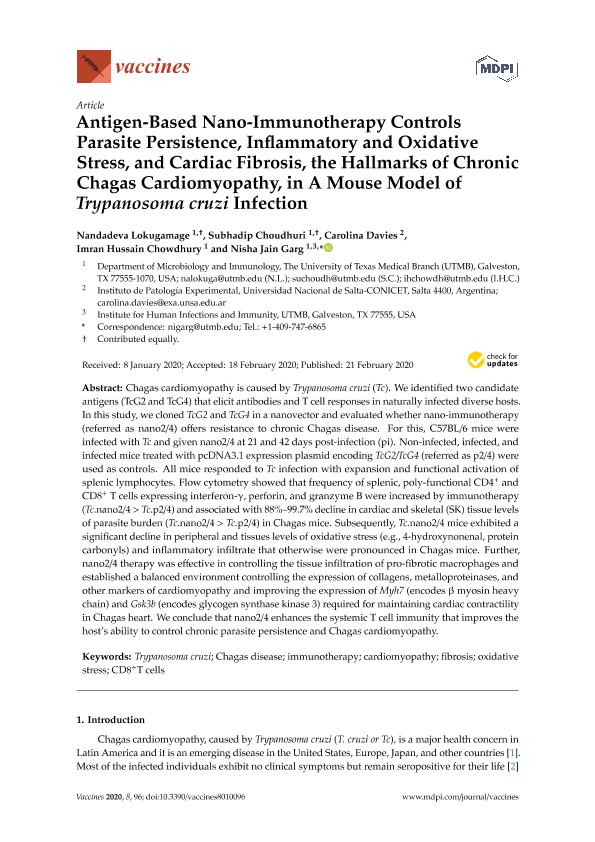Artículo
Antigen-based nano-immunotherapy controls parasite persistence, inflammatory and oxidative stress, and cardiac fibrosis, the hallmarks of chronic chagas cardiomyopathy, in a mouse model of trypanosoma cruzi infection
Lokugamage, Nandadeva; Choudhuri, Subhadip; Davies, Carolina ; Chowdhury, Imran Hussain; Garg, Nisha Jain
; Chowdhury, Imran Hussain; Garg, Nisha Jain
 ; Chowdhury, Imran Hussain; Garg, Nisha Jain
; Chowdhury, Imran Hussain; Garg, Nisha Jain
Fecha de publicación:
21/02/2020
Editorial:
Multidisciplinary Digital Publishing Institute
Revista:
Vaccines
ISSN:
2076-393X
Idioma:
Inglés
Tipo de recurso:
Artículo publicado
Clasificación temática:
Resumen
Chagas cardiomyopathy is caused by Trypanosoma cruzi (Tc). We identified two candidate antigens (TcG2 and TcG4) that elicit antibodies and T cell responses in naturally infected diverse hosts. In this study, we cloned TcG2 and TcG4 in a nanovector and evaluated whether nano-immunotherapy (referred as nano2/4) offers resistance to chronic Chagas disease. For this, C57BL/6 mice were infected with Tc and given nano2/4 at 21 and 42 days post-infection (pi). Non-infected, infected, and infected mice treated with pcDNA3.1 expression plasmid encoding TcG2/TcG4 (referred as p2/4) were used as controls. All mice responded to Tc infection with expansion and functional activation of splenic lymphocytes. Flow cytometry showed that frequency of splenic, poly-functional CD4+ and CD8+ T cells expressing interferon-γ, perforin, and granzyme B were increased by immunotherapy (Tc.nano2/4 > Tc.p2/4) and associated with 88%–99.7% decline in cardiac and skeletal (SK) tissue levels of parasite burden (Tc.nano2/4 > Tc.p2/4) in Chagas mice. Subsequently, Tc.nano2/4 mice exhibited a significant decline in peripheral and tissues levels of oxidative stress (e.g., 4-hydroxynonenal, protein carbonyls) and inflammatory infiltrate that otherwise were pronounced in Chagas mice. Further, nano2/4 therapy was effective in controlling the tissue infiltration of pro-fibrotic macrophages and established a balanced environment controlling the expression of collagens, metalloproteinases, and other markers of cardiomyopathy and improving the expression of Myh7 (encodes β myosin heavy chain) and Gsk3b (encodes glycogen synthase kinase 3) required for maintaining cardiac contractility in Chagas heart. We conclude that nano2/4 enhances the systemic T cell immunity that improves the host’s ability to control chronic parasite persistence and Chagas cardiomyopathy.
Archivos asociados
Licencia
Identificadores
Colecciones
Articulos(IPE)
Articulos de INST.DE PATOLOGIA EXPERIMENTAL
Articulos de INST.DE PATOLOGIA EXPERIMENTAL
Citación
Lokugamage, Nandadeva; Choudhuri, Subhadip; Davies, Carolina; Chowdhury, Imran Hussain; Garg, Nisha Jain; Antigen-based nano-immunotherapy controls parasite persistence, inflammatory and oxidative stress, and cardiac fibrosis, the hallmarks of chronic chagas cardiomyopathy, in a mouse model of trypanosoma cruzi infection; Multidisciplinary Digital Publishing Institute; Vaccines; 8; 1; 21-2-2020; 1-21
Compartir
Altmétricas



